Top 6 AI agents and support chatbots for Shopify stores (2026)
Looking for the best AI support solutions for your Shopify store in 2026? Whether you're a CX lead, customer service manager, or Shopify store owner, this guide compares the top 6 AI agents and customer service chatbots for automating support, reducing ticket volumes, and improving customer satisfaction. We’ll cover the best tools, features, and use cases so you can pick the right fit for your store.

Running a Shopify store comes with countless support tickets, from shipping delays to return requests and product questions. As your store grows, your support team can't keep up. That’s where AI agents come in.
In this list, we break down the top 6 AI agents and support chatbots for Shopify, comparing features, pros, and limitations so you can pick the best solution for your business.
Spoiler: If you’re serious about automating up to 80% of your repetitive tickets, Engaige is the one to beat.
What to look for in a Shopify AI agent or support chatbot
If you're scaling your Shopify support team and looking to automate tickets with AI, here’s what to look for in an AI agent:
Deep Shopify & helpdesk integrations
A great AI agent connects directly to your Shopify store and helpdesk so it can pull order details automatically and update tickets in real time. For example, when a customer asks “Where’s my order?”, the agent can instantly check Shopify for tracking info and share it, no manual lookup required.
But it’s not just about fetching a tracking link. Many WISMO (Where Is My Order) tickets come in because the shipping status is confusing or incorrect. Customers might see updates that don’t make sense, or think their package is lost. By using real-time order and tracking data, an AI agent can help clarify these issues on the spot, reduce unnecessary back-and-forth, and give customers accurate, reassuring answers right away.
Ability to take actions (not just suggest replies)
Unlike simple chatbots that only suggest text, the best AI agents can actually take actions in your Shopify store, like processing refunds, cancelling orders, or updating shipping details. This is important because customers asking about their order status often don’t just want information, they want to resolve a problem. If the tracking info is wrong or unclear, they may want a refund or request a replacement instead.
Imagine a customer who wants to cancel an order they just placed: the AI can handle the cancellation immediately, before it ships. Or if the shipment is stuck or lost, the agent can process a refund or issue a replacement without needing your team to step in.
By automating these routine yet important tasks, you reduce back-and-forth emails and help customers get what they want quickly, freeing up your team to focus on more complex issues.
Trained on your business policies
Your AI agent should understand your unique return windows, shipping rules, and discount policies so it always gives accurate, on-brand responses. For example, if you have a 30-day return policy on shoes but final sale on accessories, the AI will know not to promise a refund where it isn’t allowed. By being trained on your policies, it helps avoid misunderstandings, reduces escalations, and makes sure customers always get consistent, reliable answers.
Context-aware: sees orders, history, and knows your tone of voice
A context-aware AI agent doesn’t just see the latest message, it has visibility into the customer’s entire order history and past support interactions. If someone writes in about a missing item, it can check their recent orders and see that part of the shipment went separately, then respond with:
“Hi Emma, I see your shirt shipped separately on July 2nd. Here’s the tracking link.”
It’s not just about knowing the facts, it’s about delivering answers in a tone that feels human, friendly, and aligned with how your support team would naturally respond. This level of customer service responses makes your support feel human, not robotic.
Proven ROI through reasoning, ticket deflection & resolution
One of the biggest benefits of a strong AI agent is its ability to deflect and resolve the repetitive tickets that take up most of your team’s time, like “Where’s my order?” or “How do I return this?”.
But ROI isn’t just about automation, it’s about reasoning. A good AI agent can understand what your customer is really asking, apply your policies and context, and choose the right next step automatically.
By combining this reasoning ability with automation, you can deliver fast, accurate resolutions, reduce manual workload, and let your team focus on more complex or high-value conversations.
What’s the difference between a chatbot and an AI agent?
Now that you know what to look for in an AI agent, it’s also important to understand how these differ from basic chatbots. While people often use “chatbot” and “AI agent” interchangeably, there’s an important difference. Especially for busy Shopify stores.
A basic chatbot is usually rule-based or keyword-triggered
It follows simple scripts to answer FAQs like “What are your opening hours?” or “Do you ship internationally?”. These bots are limited because they can’t understand customer context or take meaningful action in your Shopify store. If a customer asks to cancel an order or check delivery status, the chatbot typically says: “Please wait for an agent” or gives them a link to your help page.
Pros and cons:
✅ Cheap and easy to set up
✅ Good for very simple FAQs
❌ Can’t access Shopify data or perform actions
❌ Often frustrate customers with dead ends (“Please email us”)
An AI agent is designed to automate support tasks, not just answer questions
It connects directly to your Shopify store and helpdesk, so it can check real-time order data, process refunds, cancel orders, update addresses, or even create discount codes on the fly. For example, if a customer messages: “Can I cancel order #1234?”, the AI agent can check if it’s unfulfilled and cancel it immediately, updating the customer without any human intervention.
Pros and cons:
✅ Can handle real support tasks end-to-end
✅ Personalised responses with real order data
✅ Reduces workload for your team by solving issues automatically
❌ Slightly more complex to implement (needs integrations and training)
When evaluating customer service tools (like the ones on this list), you’ll often see both types marketed as “chatbots,” so it’s important to look carefully at what they actually do. A true AI agent for Shopify should be able to integrate with your store, understand your policies, and take action on behalf of your support team. That’s how you bring a better experience for your customers while making life easier for your support team.
The list: top 6 AI agents and support chatbots for Shopify (2026)
Alright, enough with the theory. It’s time to take a closer look at the different AI agents and support chatbots. What exactly do they do, how do they differ, and what’s the best use case for each tool? Let’s find out below.
1. Engaige
Engaige (that’s us!) is an AI agent for customer service built specifically for Shopify support teams in industries like fashion, beauty, and electronics.
Our AI agent doesn’t just respond to tickets, it actually resolves up to 80% of them end-to-end by deeply understanding your ecommerce products, policies, and workflows. Because let’s face it: just sending a tracking link isn’t real resolution, it’s basic automation. Real support means knowing what your customer truly needs and taking the right action. That’s exactly what Engaige does.
How? By using real-time data from your customer service tech stack. You can train it based on your company-specific policies so it knows exactly how to interpret information requests and can take the necessary steps to resolve customer questions successfully.
For example, our AI agent can handle return requests for clothing items during seasonal sales or process warranty claims for electronics without needing human intervention.
The result? You can automate 40–80% of your repetitive tickets without compromising customer experience, so your team can spend time on the issues that really need their attention.
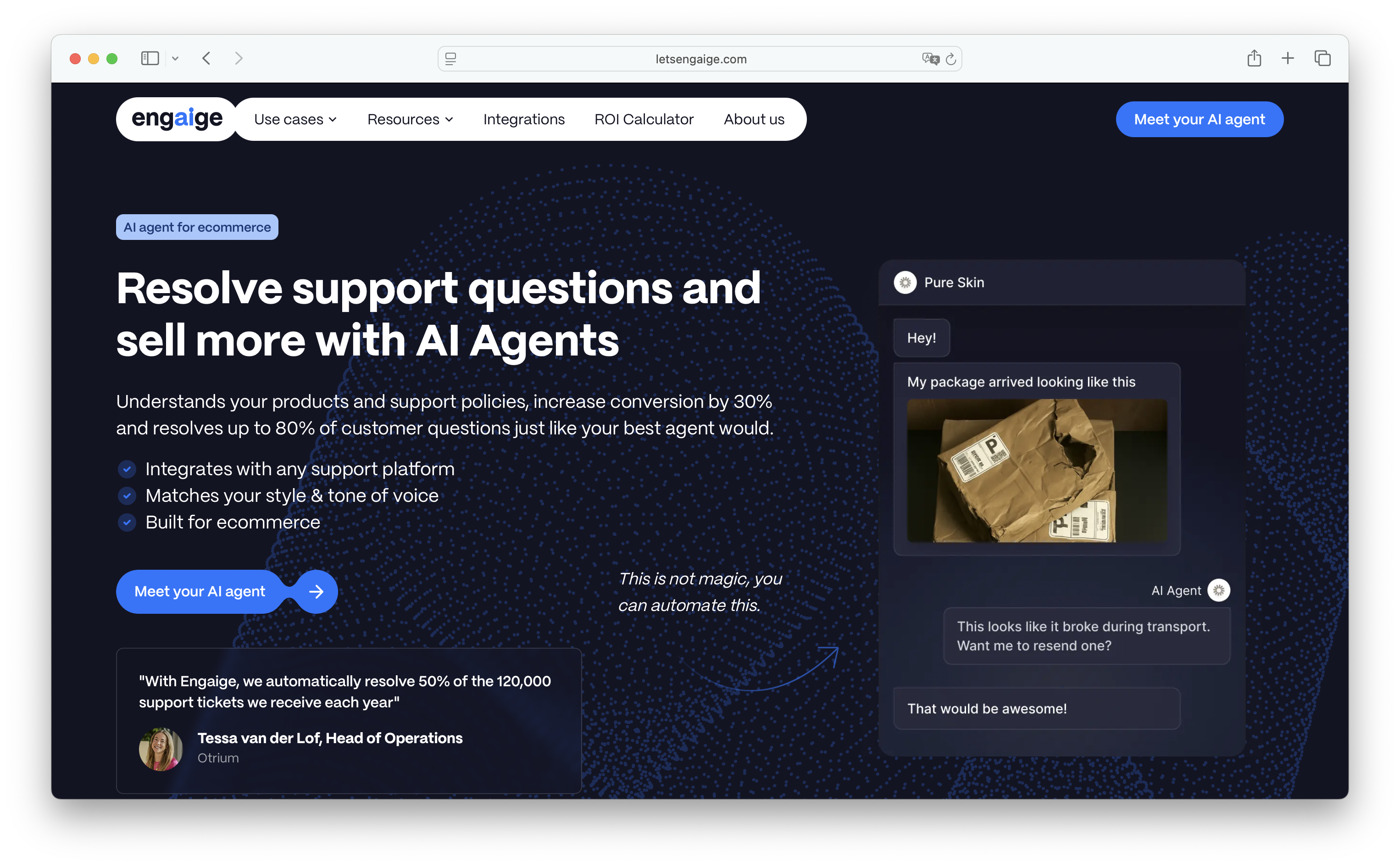
Website: https://www.letsengaige.com/
Key Features
- AI agent trained on your company’s policies
- Fully integrated with Shopify, Mollie, UPS & more
- Customizable policy builder
- AI agent integrated with your product catalogue
- Automes conversations via email, chat and social
- You can test your AI Agent outputs in a quick and controlled way
Pros
✅ Automates up to 80% of repetitive tickets
✅ Gives you full control and transparency over AI behaviour
✅ Better CX, plus: you're able to scale your business while cutting costs in CS
✅ Higher conversion rates from your CS team because the AI agent is able to effectively help customers find what they're looking for
Cons
❌ Needs initial training on your policies (but that's why it works!)
Best for: Shopify stores in fashion, beauty and consumer electronics looking to scale customer service with deep automation.
2. Gorgias
Gorgias is a multichannel e-commerce support platform with a built-in AI agent designed to help Shopify stores sell more and resolve customer inquiries efficiently. Its AI can handle up to 60% of support tickets by giving responses that feel human.
With Gorgias, you can edit Shopify orders and access real-time product information. While the platform helps handle common questions and suggests personalised recommendations, it still relies on human agents to handle more complex issues quickly and effectively.
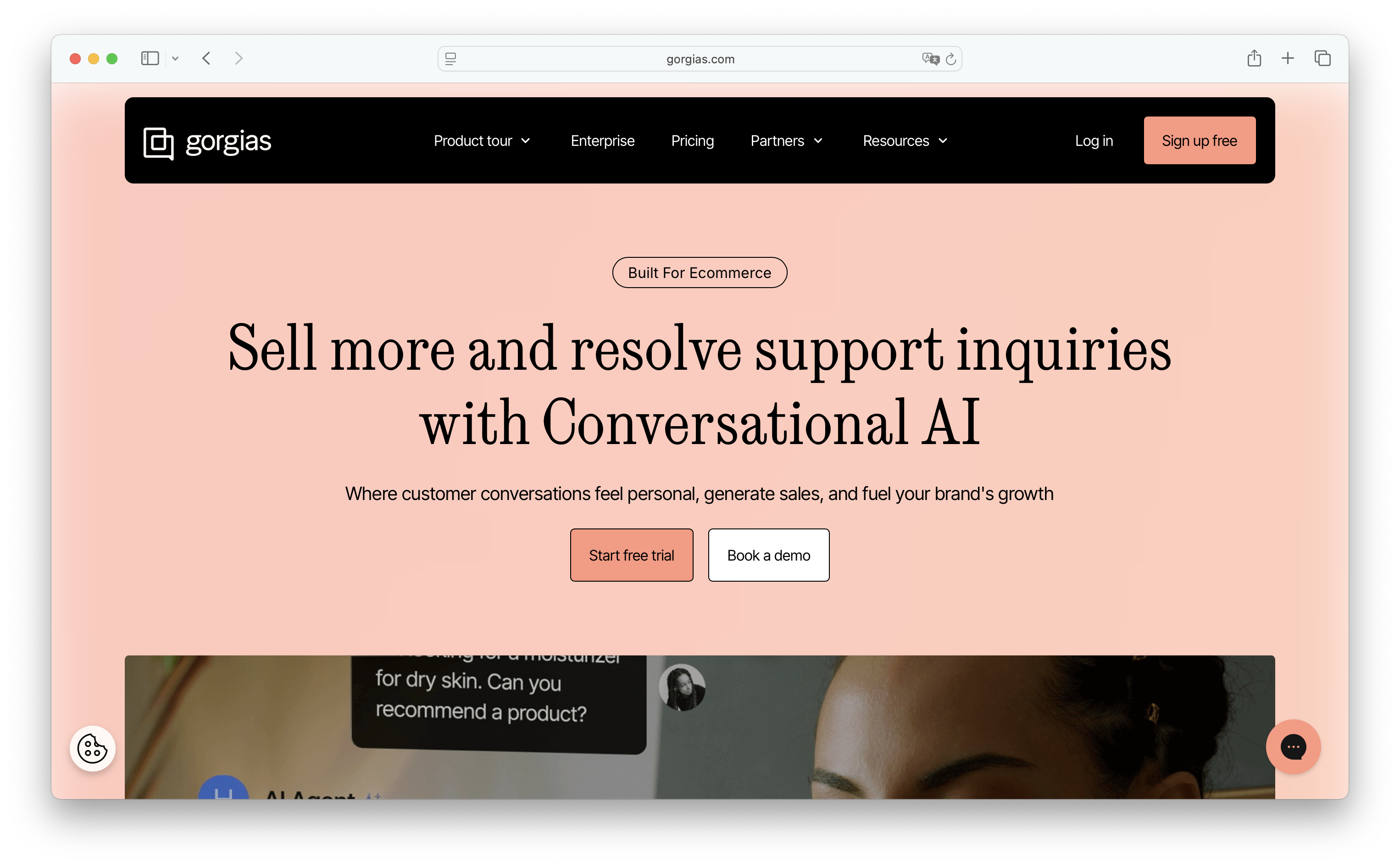
Website: https://www.gorgias.com
Key Features
- Strong, native Shopify integration
- Multichannel inbox combining email, chat, and social in one platform
- Robust macros for agent productivity and consistent responses
- AI Assist (limited to suggestions)
Pros
✅ Built specifically for Shopify
✅ Strong helpdesk features
✅ Improves agent productivity with suggested responses and shortcuts
Cons
❌ AI is primarily agent assist, not true end-to-end automation
❌ Requires human agent involvement on most tickets
❌ Designed as a full helpdesk platform, not as an AI agent
Best for: Shopify stores that want a helpdesk platform, not full automation.
3. Tidio
Tidio is ideal for small and medium businesses that want a quick setup and lightweight AI solution. Its easy-to-use live chat and AI chatbot, Lyro, focuses on FAQs and simple replies across chat, email, and social channels in 12 languages. It can automate up to 67% of repetitive conversations.
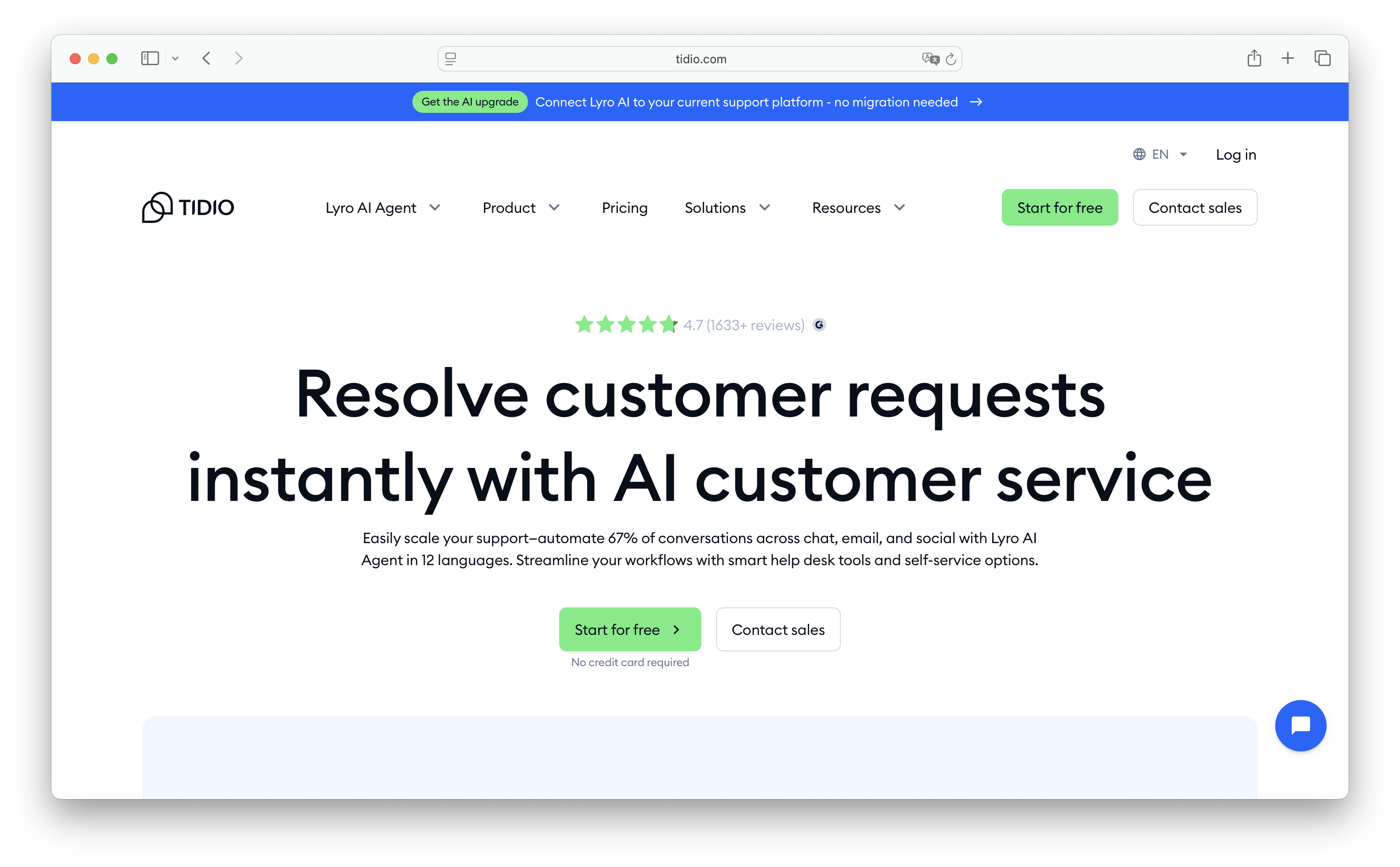
Website: https://www.tidio.com/
Key Features
- Quick installation and setup, perfect for small and medium businesses
- Customisable website chat widget to match branding
- Omnichannel inbox for managing chat, email, and social
- “Lyro” and Smart Views AI for automatic conversation classification and FAQ answering
Pros
✅ Easy to set up
✅ Combines live chat and AI chatbot in one platform
✅ Omnichannel support improves customer experience across channels
✅ Highly customizable chat widget for website integration
Cons
❌ AI is FAQ-focused, unable to take actions in other systems
❌ Shallow back-end integrations limit advanced workflows
❌ Not purpose-built for e-commerce
❌ Low overall automation rates
Best for: SMBs needing a simple AI chatbot without deep automation.
4. Richpanel
Richpanel is a multichannel e-commerce helpdesk platform with an AI agent, designed to improve customer service efficiency for online merchants. The platform has a strong e-commerce focus with store integrations for order lookups and basic actions.

Website: https://www.richpanel.com/
Key Features
- Branded self-service portal
- Sidekick AI for reply suggestions
- Centralised multichannel inbox
- Automation rules and workflows for routing and managing tickets
Pros
✅ Lets you quickly set up self-service to reduce ticket volume
✅ Designed for e-commerce with order data integrations
✅ Sidekick AI improves agent response speed with suggested replies
✅ Multichannel inbox makes customer support management easier
Cons
❌ Deflects tickets, doesn’t resolve them
❌ Requires full adoption of Richpanel’s platform
❌ Still agent-heavy for complex issues
❌ Customers may get answers but can’t complete actions independently
Best for: Reducing ticket volume via self-service, not full automation.
5. Zendesk
Zendesk is an enterprise-grade solution with powerful workflows and integrations. But its AI is more about managing complexity than resolving e-commerce tickets end-to-end. This platform focuses on large support teams.
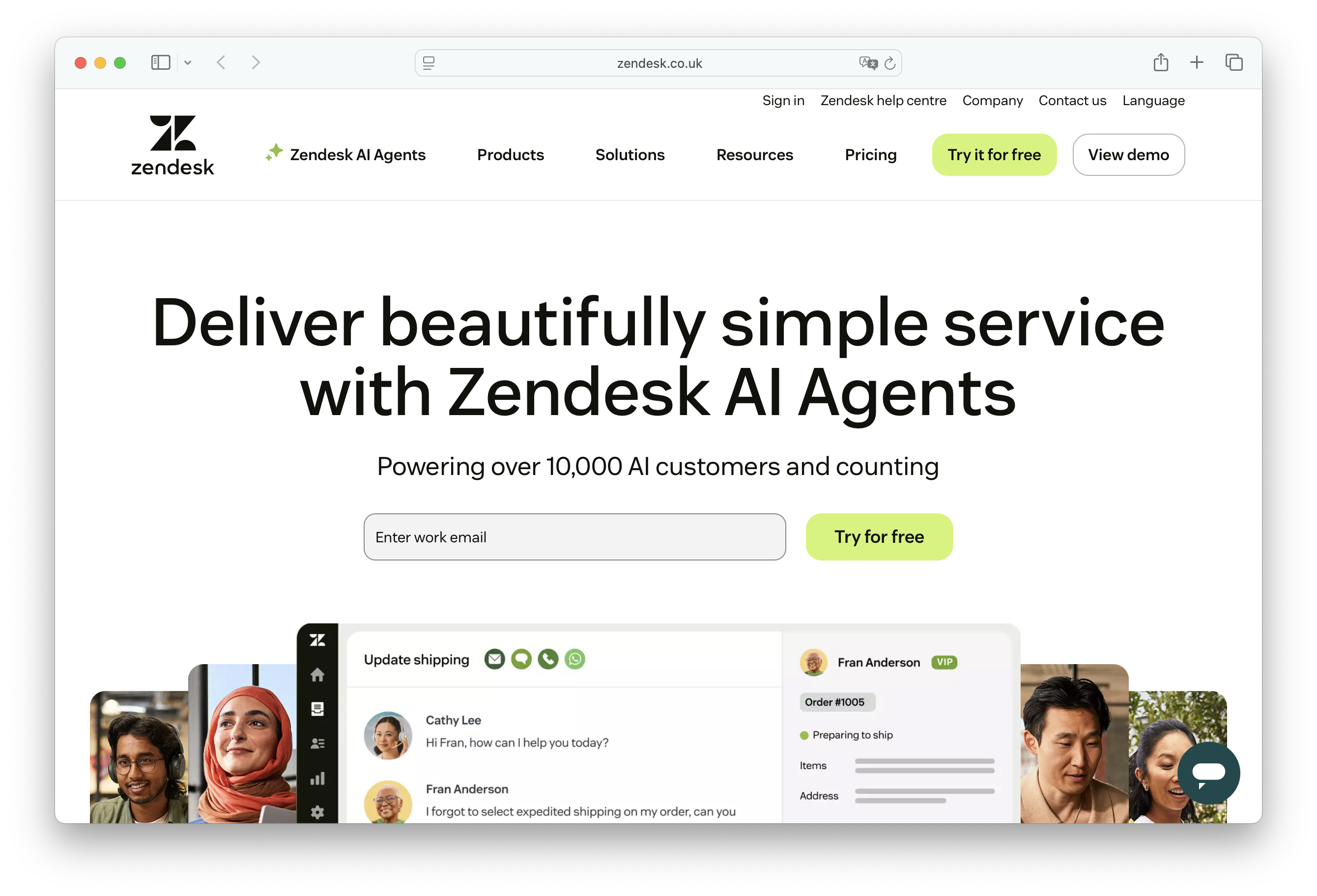
Website: https://www.zendesk.co.uk
Key Features
- Omnichannel ticketing system that works out of the box for email, chat, and social
- Advanced SLAs, routing rules, and analytics to manage complex operations
- 1,500+ marketplace integrations
- AI bots for article recommendations
Pros
✅ Omnichannel support across all major customer contact points
✅ Advanced SLA management and analytics for professional operations
✅ Improves agent efficiency with suggested help articles and ticket deflection
Cons
❌ Industry-agnostic: not deeply tailored to e-commerce use cases
❌ High cost and complexity for small or midsize e-commerce teams
❌ You’ll need a large support team and heavy customisation to get real automation results in e-commerce
Best for: Enterprise teams managing high ticket volumes with complex workflows.
6. Re:amaze
Re:amaze is a multichannel e-commerce helpdesk with an AI agent that helps online merchants bring all their customer conversations, like email, live chat, and social, into one simple inbox. Its AI is designed to handle FAQs, look up orders, and make agents more productive.
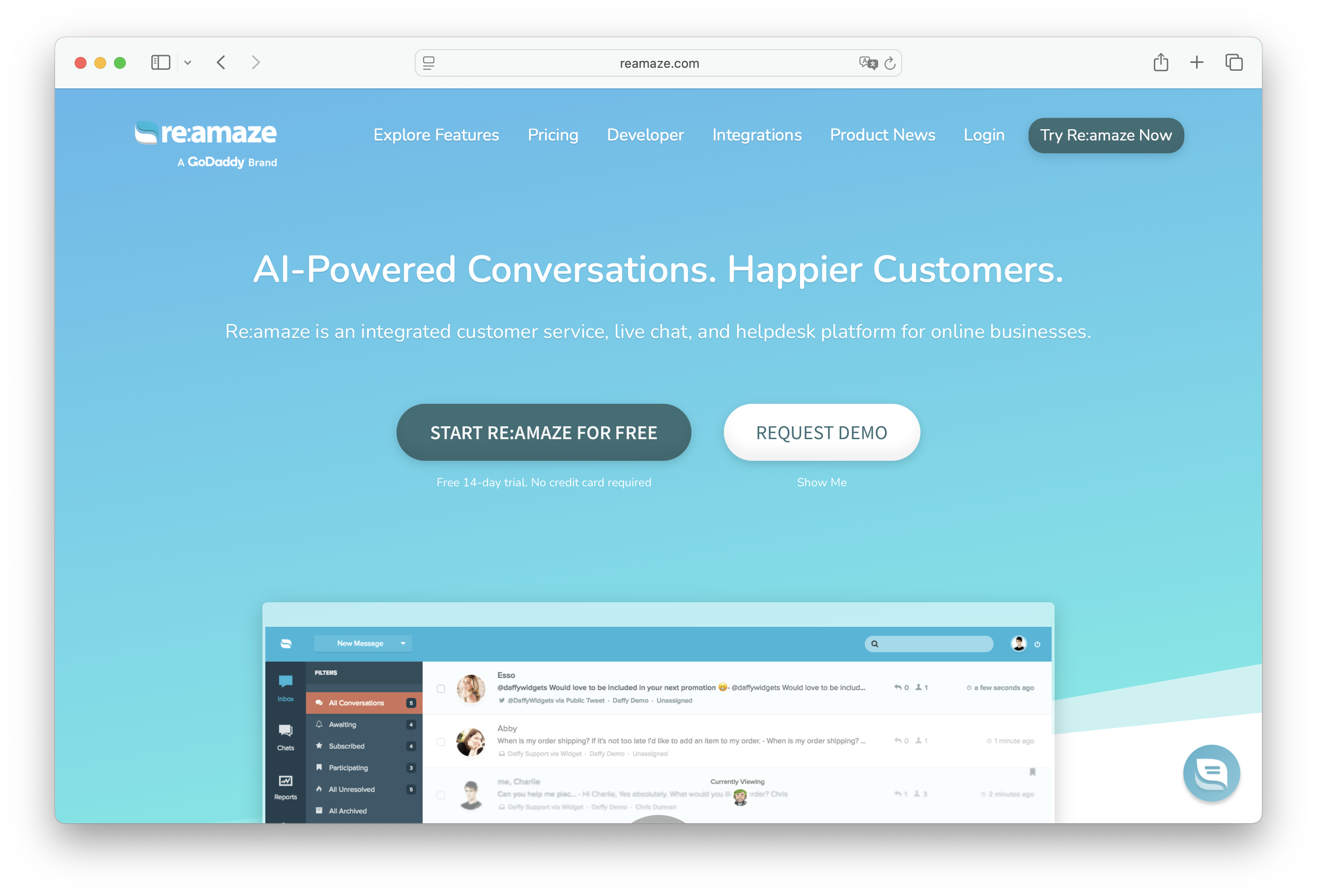
Website: https://www.reamaze.com/
Key Features
- Unified inbox across email, live chat, social, SMS, and voice channels
- Native ecommerce integrations (Shopify, BigCommerce, WooCommerce) that let agents create or edit orders directly in the chat
- Three pre-built chatbots (Hello, FAQ, Order) to automate common questions and order lookups
Pros
✅ Multichannel inbox to handle every support channel in one place
✅ Strong e-commerce integrations
✅ Agents can create or edit orders right inside the chat interface
✅ Mobile apps keep teams connected anywhere
Cons
❌ Many issues still require human agents to resolve
❌ Focuses on agent productivity and self-service, not full autonomous resolution
❌ Requires teams to work inside Re:amaze’s own UI, which may limit flexibility with other tools
Best for: Teams that want AI assist, not full automation.
Comparison of the best AI agents and support chatbots for Shopify stores
Why Engaige is the best AI agent and support chatbot for customer service
Most tools on this list stop at suggesting replies or deflecting tickets. Engaige actually resolves them.
Because our AI agent is fully embedded into your tech stack and trained on your policies, it acts like a true team member, not just a chatbot. From tracking orders to processing returns or answering complex questions, Engaige handles it all.
And the results speak for themselves:
- 40–80% of repetitive tickets automated
- Higher conversion rates from your CS team
- Happier customers and a more efficient support team
So, if you're ready to free up your team and handle up to 80% of your tickets automatically, book a demo with Engaige today.
FAQs about AI agents and support chatbot for customer service
1. What are some of the best AI agent platforms for handling customer service in e-commerce?
Top platforms include Engaige, which is your best option for context-aware automation and Shopify integration, as well as others like Gorgias, Zendesk, and Tidio. Each offers different levels of automation, integration, and customisation for e-commerce stores. You can find all the features, pros, and cons of these platforms in this article above.
2. What are the pros and cons for using AI agents and support chatbots in customer service?
Pros include faster response times, lower support costs, and 24/7 availability. Cons can include limited handling of complex cases and the need for training or setup to align with brand voice and policies. This depends on the AI agent.
3. Can an AI agent handle our specific policies and workflows?
Yes. Unlike generic chatbots, AI agents can be trained on your store’s unique policies, like return windows, warranty rules, and shipping rates. This means they won’t just give generic answers but will apply your exact rules when processing returns, cancelling orders, or answering questions. It helps ensure customers get consistent, accurate responses every time.
4. How can AI agents and support chatbots improve customer service in e-commerce?
They cut down wait times, answer common questions immediately, and provide clear, reliable responses every time. More advanced AI agents can access customer and order information to solve problems on their own, increasing CSAT and making your support team’s work easier.
5. How can AI agents and support chatbots in customer service help sales numbers?
By answering questions quickly and offering instant pre-sales help, AI agents help cut down cart abandonment and boost conversion rates. Plus, they free up your human team to focus on the important part: building loyalty and encouraging repeat purchases.
Lower your cost per resolution with AI customer service automation
Further reading
Continue learning with these resources about AI customer service automation.








.webp)
